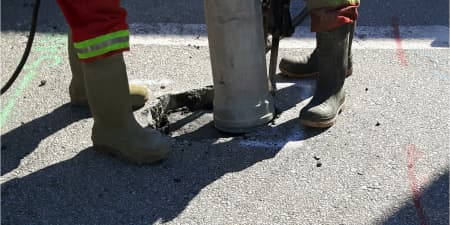What is Vacuum Excavation? A Safer Approach to Digging
As construction and excavation industries continue to evolve, vacuum excavation stands out as an innovative approach that's redefining traditional digging methods. In this article, we will delve into the world of vacuum excavation, exploring its mechanics, types, applications, safety advantages, and best practices. Read on to discover why vacuum excavation is becoming increasingly popular in various industries.
The Mechanics of Vacuum Excavation
Vacuum excavation, often referred to as "non-destructive digging," utilizes a combination of air or water and a vacuum system to excavate soil and remove debris. This process is remarkably simple yet highly effective.
It starts with the injection of pressurized air or water into the ground, loosening the soil. Simultaneously, a high-powered vacuum system sucks up the soil and debris, transporting them to a debris tank for later disposal. This method ensures precision and control, making it ideal for various applications.
Types of Vacuum Excavation
There are primarily two types of vacuum excavation methods: hydro excavation and air excavation, each with its own set of advantages and disadvantages.
Hydro Excavation
Hydro excavation, as the name suggests, involves the use of pressurized water to break up the soil. This method is suitable for a wide range of applications, including potholing, daylighting, and exposing utilities. Its non-destructive nature makes it especially valuable when working around delicate underground infrastructure. The water is typically contained in a separate tank and mixed with air to create a slurry that can be easily vacuumed.
Air Excavation
Air excavation, on the other hand, relies on compressed air to displace the soil. It is a faster and more efficient method, making it an excellent choice for projects where speed is crucial. However, it may not be as precise as hydro excavation, and it may not be ideal for projects requiring the preservation of the excavated material.
Learn more about different types of excavation and what machines can be used.
The Different Applications of Vacuum Excavation
Vacuum excavation's versatility has made it an invaluable tool across various industries. Some of the key applications include:
-
Utility Locating: When precise excavation is needed to expose and identify utilities like gas lines, water mains, or fiber optic cables, vacuum excavation provides a non-destructive and safe solution.
-
Pipe and Cable Installation: Vacuum excavation is used to create trenches for the installation of pipes and cables without damaging existing infrastructure.
-
Construction: It aids in digging foundation holes, removing debris, and providing access to confined spaces on construction sites.
-
Excavating in Frigid Conditions: Where the ground is frozen solid, a stream of high-pressure, heated water is employed to thaw the icy ground, making it easy to excavate swiftly with vacuum suction excavation.
-
Environmental Remediation: Vacuum excavation helps in the safe removal of contaminated soil and materials in environmental cleanup projects.
Safety and Environmental Considerations in Vacuum Excavation
One of the most significant advantages of vacuum excavation is the commitment to safety and the environment. It also reduces the risk of damaging underground utilities, which can lead to costly repairs and safety hazards.
Additionally, vacuum excavation minimizes soil disturbance and dust emissions, making it an eco-friendly choice. The reduced risk of accidents, such as gas line ruptures, further emphasizes its safety benefits.
Best Practices for Vacuum Excavation
-
Accurate Utility Locating and Planning: Before starting the project, locate any utilities to avoid potential damages and ensure a safe and efficient excavation plan.
-
Operator Training and Certification: Well-trained, certified operators are crucial for safe and efficient equipment handling, troubleshooting, and maximizing productivity.
-
Regular Maintenance and Equipment Inspection: Routine maintenance and inspections prevent unexpected breakdowns, ensuring the equipment operates at its best and extends its lifespan.
-
Proper Disposal of Debris and Slurry: Follow local regulations to responsibly dispose of excavated materials, considering specific guidelines for hazardous or contaminated materials to protect the environment and public health.
-
Strict Adherence to Safety Protocols: Make safety the top priority with personal protective equipment, traffic control measures, and regular safety meetings to keep the team updated on best practices and potential hazards.
Conclusion
Vacuum excavation can be a safer and more efficient alternative to traditional excavation methods. The versatility, precision, and environmental benefits of vacuum excavation make it a valuable tool in various industries.
If you're looking for traditional excavation methods, DOZR has you covered with digging equipment rentals including mini-excavators or full-size excavators. Search for excavating and earthmoving equipment now.

